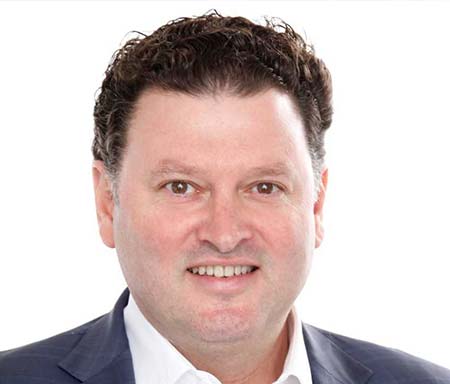Board and committees
At Home Care is supported by the Board of Directors and actively facilitates and participates in the Clinical Governance Committee, At Home Care Reference Group and Quality Assurance Panel for the Authorisation of Restrictive Practices.
Jon Morris

Jon Morris is the Managing Director of At Home Care and has worked in the disability sector for the past 19 years. He is a passionate advocate for disability and strives for independence, inclusion and empowerment for all people living with a disability, which is a key focus of his work.
Jon holds an MBA from UWA Business School together with a BSc and is a Graduate of the Australian Institute of Company Directors (AICD).
Jon has previously held not for profit Board roles for ReboundWA (previously Wheelchair Sports WA) and the Paraplegic Benefit Fund.
David Bayly

David Bayly is an independent Barrister specialising in personal injury litigation. David was admitted to practice in 1994 and was a Director of Bradley Bayly Legal since its incorporation in 2001, until he took up a position at the independent bar in 2019. David has vast experience in representing all injured Plaintiff’s, but has a particular passion for acting for Plaintiffs who have suffered life changing physical and psychological injuries.
David has lectured at the University of Paderborn as a guest lecturer, is a regular lecturer for the Royal Australian Colleges of Orthopaedic Surgeons, Psychiatrists and Occupational Physicians. David also presents bi-annual lectures at the Post Graduate School of Psychiatry at Graylands Psychiatric Hospital and regularly prepares papers for the Law Society of Western Australia and the Australasian Society for the Study of Brain Impairment.
David’s passion for, and dedication to, righting legal wrongs is his driving force and he is committed to continuing the fight for the rights of catastrophically injured people and their families.
Gerard Hardisty

Gerard Hardisty is a founding member of the Western Orthopaedic Clinic, one of Perth’s premier Orthopaedic groups. His special interests are regenerative medicine and arthroscopic surgery including cartilage and tendon grafting. He is an advocate of early discharge and home-based rehabilitation and is published on this and cartilage transplantation.
Gerard attained his medical degree at UWA and then trained as an Orthopaedic Surgeon, receiving his Fellowship of the Royal Australasian College of Surgeons in 1993. Gerard commenced post-fellowship training in Sydney and North America in Sports Medicine, Knee, Foot and Ankle Surgery. He was a trauma fellow in Augsberg, Germany.
Gerard is a Clinical Adjunct Associate Professor at UWA and currently mentors, as well as teaches, medical students.
Clinical Governance Committees
The role of the Clinical Governance Committee is to review clinical service delivery. The group provides expert, balanced and timely advice to support the provision of high-quality, client-focused, evidence-based, clinical practice and service development. The committee reviews clinical policies, procedures, and risk mitigation, and provides clinical advice, guidance, and education in relation to services offered by At Home Care. The Clinical Governance Committee is chaired by At Home Care’s Head of Client Experience and Development, Dee Donachie (RN), with support from Clinical Nurse Manager Tanya Woodward (RN) and clinical oversight by our Clinical Medical Director, Associate Professor Gerard Hardisty. The committee meets six monthly or more regularly if required.
At Home Care Reference Group
The At Home Care Reference Group brings together representatives from the community to meet six-monthly and provide input and advice to the At Home Care Board. The group ensures At Home Care is continually looking at ways to improve our service and assist in promoting a culture of inclusion and rights for people living with a disability.
The Reference Group is comprised of:
- Leanne Pearman, CEO, WA Individualised Services (WAIS)
- Lauren Hart, Occupational Therapist and Founder, Optimal Living Therapy
- Larry Green, Client Representative
- Sheryl Thyne, Client Representative
- Kerry Harvey, Client Representative
- Dion Smith, CEO, At Home Care
- Dee Donachie, Head of Client Experience and Development, At Home Care
- Tony Edwardes, Quality, Compliance and Risk Manager, At Home Care
Quality Assurance Panel for the Authorisation of Restrictive Practices
The purpose of the Quality Assurance Panel is to ensure any Restricted Practices are implemented in line with the Authorisation of Restrictive Practices in Funded Disability Services Policy and Procedural Guidelines, as issued by the Department of Communities – Disability Services.
Restricted Practices can only be used as a last resort in response to a risk of harm, and only after the exploration and application of other evidence-based, person-centred and proactive strategies.
In accordance with the Policy, At Home Care will appoint two senior representatives who have operational knowledge and relevant experience in behaviour support and restrictive practices, to be part of the panel. One of these representatives will be chair.
Additionally, an independent Behaviour Support Practitioner will also be involved. They will have appropriate industry expertise and selected from the panel provided by the Department of Communities.
Partners and Affiliations
At Home Care is proud to be affiliated with the following organisations: